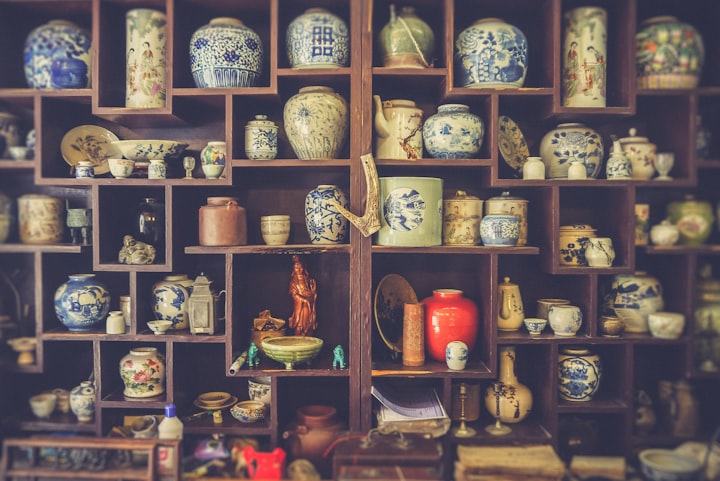Disrepair
What money can buy

The famous Mila Wainwright died surrounded only by her many regrets. She was discovered by her agent, laying on a purple tufted chaise, still clutching an unsent letter. The cause of death was of little interest to anyone compared to her estate. After years of being blinded by the spotlight’s glory, Mila had acquired quite a sum and lived in extravagance. Now the scavengers had come.
The main house was stately—white, Victorian with grand pillars, wrought iron gates, and a wrap-around porch. It sat on hundreds of acres sprawling under the New York rising sun. Yet, it wasn’t the house that captured the attention of the mob. Instead, the people were gathered outside an unassuming, dilapidated barn. Most of the house’s contents had already been auctioned off to museums, leaving lesser remnants to be moved to the barn. Still, it wasn’t the leftovers that spurred the attention.
Within the leaning beams, widely spaced boards, and cobweb-ridden archways hid a rumor. Whispers informed the listening ear that before she died, Mila hid her most prized possession in that barn. The curators searched to exhaustion but were unable to find what they hoped was a Faberge egg or a rare Ming vase. So they left the rumor to the public.
Outside the barn, the people waited for their numbers to be called.
Number 45 stood close to 46, wearing a brown flannel shirt and jeans, his hair was tousled, and he kept his hands in his pockets as he leaned over to gossip.
“I heard it’s a steamer trunk full of cash,” he failed to whisper.
Number 46 wore a corduroy jacket with elbow patches, a stylish pair of round tortoiseshell glasses, and a fuchsia silk handkerchief in his breast pocket. His hair was perfectly quaffed and he held his arms close to his chest while he talked with his hands.
He whispered back “really, cash? I would think it’d be something more elegant, like a rare piece of china.”
“You’re both wrong,” number forty, a Ukrainian woman in a tan leather jacket, spat from a few yards away. Her long light brown hair rested just past her shoulders, her arms were crossed, but she smiled with intrigue.
“Excuse me, this is a private conversation,” snapped 45.
The woman didn’t care about their privacy and couldn’t hold her excitement. She leaned forward to whisper again, “I heard it’s a painting worth two million dollars.”
46 raised an eyebrow in interest. “Really? Fascinating!” he gushed.
As they were speaking he could see an older man with a prosthetic leg cresting the hill beyond 40. The man was dragging something long and slender behind him.
“Who brings a shovel to an estate sale?” 46 muttered under his breath.
The deep grooves of the newcomer’s face were a testament to his many years, his ice blue hollow eyes only held mystery. After 49 claimed his number, he stood just off to one side and gawked at the barn’s disrepair. Tears welling in his eyes.
“Old people get emotional about every little thing,” remarked 45 to 46, this time more softly.
The curator, a woman in her 50’s with a neat short bob, emerged from the barn.
“Hello there! Group 30 will be leaving the barn momentarily. I'd like to tell you a little about this strange structure behind me. Few realize this property, just the one-acre the barn rests on, actually belonged to the Wainwright family...” she continued but no one was listening. They were all daydreaming about their upcoming fortune.
Group 30 began trickling out of the barn, grumbling and murmuring to themselves about what they didn’t find. One person emerging into the daylight remarked, “whatever she was hiding, she hid it well.”
Another man chimed in, “I was convinced, it had to be David Webb’s diamond brooch. Nothing!”
“I was certain it was an original Waterhouse painting—the letter said ‘her’,” the last woman explained.
The letter found with Mila read; “I want to get my Rosebud from the barn. I’ve always loved her. We could retrieve her together.”
The summer sun broke through the wide boards, illuminating the dust in the air. As the forties stepped inside, they gingerly filtered throughout the barn, carefully navigating the dirt floor’s divots. Just a few tables in a neat row presented the fringe wares of Mila Wainwright. Each person slowly inspected every item, restraining their mounting excitement.
Number 46 cooly held a teacup up to the available light, inspecting how the color responded to its exposure, while 45 eyed the tools on the wall; rake, garden hoe, scythe, snow shovel.
Meanwhile, 40 gravitated to the frames but found them empty—no masterpiece.
Amidst the excitement, 49 just stood in the middle of the barn with his shovel and stared at the hole in the roof.
“Do you think he has dementia?” 46 asked 45.
“I don’t know, what do you think of this?” 45 held up a blue-green ceramic bowl.
“Oh. My. Word... is that what I think it is?” 46 ripped the bowl from his friend’s hands and held it close to his face, tilting his tortoiseshell glasses to see more carefully.
“Do you see those cracks?”
“No.”
“Look. Look, right there.”
“Oh. Yeah. So it’s worthless?”
Number 46 gritted his teeth and forced a stern, “No.”
He quickly glanced around to ensure nobody else was watching.
Everyone was preoccupied with what they were inspecting, aside from 49 who was now standing in a barren horse stall.
Number 46 bent closer to 45 and whispered as poorly as ever “there’s a famously rare kind of Chinese pottery, Ru Ware, from one particular dynasty and one particular kiln. They have a famous crackle to their glaze. They’re worth millions.”
“Where would she find one of these?”
“I guess money can buy anything.” His eyes filled with hope and dollar signs as he tucked the bowl in the crook of his arm for safekeeping. In a second it was gone, snatched from behind him.
He whipped around to see the Curator holding the possibly infamous ware in her hands.
“This isn’t for sale. Sorry.”
“Give it back, lady!”
Forty-nine noticed the argument and calmly left his corner.
“No. I’m sorry. It’s simply not for sale.”
The two stood staring at each other stubbornly.
Forty-nine was now standing just behind the Curator but 46 was too enraged to notice.
“Like Hell, it isn’t!”
Number 46 glanced around feverishly and grasped for something laying on the table. As he turned around he revealed a sickle which he held out toward the Curator’s face and demanded through his gritted teeth, “Give. It. Back.”
Forty-nine stepped up from behind the Curator and pushed her to the side. She and the bowl tumbled to the dirt. With one fluid motion, 49 took both his hands and placed them on either side of 46’s outstretched wrist, and pushed in opposite directions. The sickle fell to the ground. Both the men went for the weapon but 49 was quicker.
“Who are you, weirdo?”
“It’s a fake, you money thirsty, parasite," 49 lashed out. Number 46 stared back at him blankly.
“You don’t believe me? Look at the bottom. There are no marks. There should be 3-5 sesame-shaped marks on the... I swear…” he muttered under his breath as he gave up and turned away. Shaking his head in disgust, he sauntered back to his far corner and took the sickle with him.
Number 46, quickly grabbed the bowl before the Curator and looked at the bottom. The crazy old man was right. He let his arms fall. Handing the worthless ceramic vessel to the Curator, he summoned 45 and left defeated.
In the far horse stall, in the back right corner, 49 crouched over a hole in the ground. He reached in and pulled out an olive green metal box with chartreuse letters printed on the side. The paint was faded and peeling but he could still make out the words:
840 cartridges
5.56 mm
Ball M 193
10 rounds. Clips
Bandoleers
Lot LC-2-96
He paused for a moment. A tear fell from his eye. Then he steeled himself and lifted the latch to find three things. First, he held a pair of dog tags engraved with the name Wainwright, Conroy. He rubbed his thumb over the letters and then placed those back in the box. Next to those was a faded black and white photograph of a little girl outside of a rundown barn, standing next to a tall, dashing gentleman. He moved it aside and reached for the third thing.
She was worn but he hadn’t expected much to be left after sixty years. Her yellow yarn hair was still mostly there. Her rose printed smock was faded and a bit yellow, but her face was still cheerful. He gingerly reached around the back of the doll and folded back the inside of her shirt. There it was, embroidered in burgundy stitches, “To Mila, love Pop.” He squeezed the doll tight and wept.
About the Creator
Meagan Dion
My life is a little crazy. Four kids, homeschool, write, create and coffee. Coffee is a verb. Do you coffee? I aspire to blow glass and finish / publish my novel. I would like to have an impact. Also, coffee.






Comments (3)
That was Good. The kind of thing I'd write, where nothing is exactly what you think it is through most of the story. In this case, the "Treasure" And the treasure is only worth anything to a certain person with a very personal connection to the dead Lady.
great story
A truly beautiful story! The other people searching for treasures thought of monetary value and were greedy for gain. It never occurred to them that the real treasure was treasure of the heart, worth more to the elderly lady than any fine museum art could ever be.